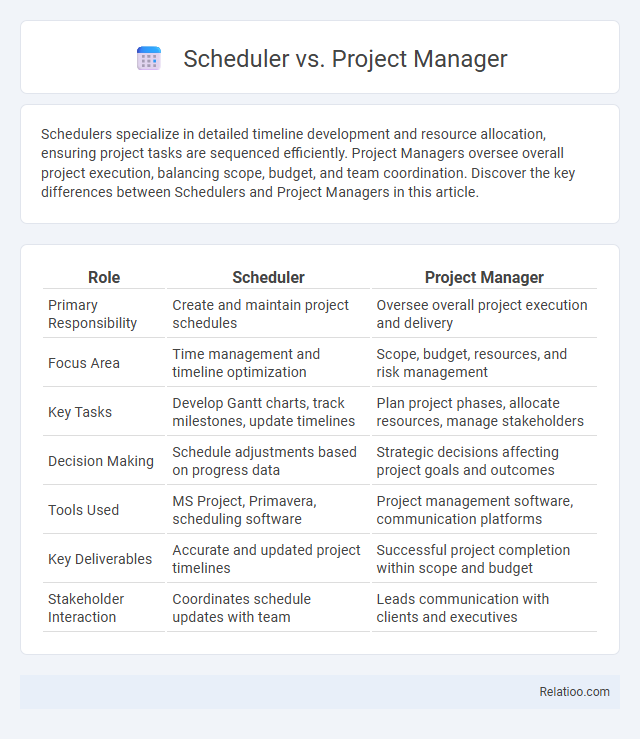Schedulers specialize in detailed timeline development and resource allocation, ensuring project tasks are sequenced efficiently. Project Managers oversee overall project execution, balancing scope, budget, and team coordination. Discover the key differences between Schedulers and Project Managers in this article.
Table of Comparison
| Role | Scheduler | Project Manager |
|---|---|---|
| Primary Responsibility | Create and maintain project schedules | Oversee overall project execution and delivery |
| Focus Area | Time management and timeline optimization | Scope, budget, resources, and risk management |
| Key Tasks | Develop Gantt charts, track milestones, update timelines | Plan project phases, allocate resources, manage stakeholders |
| Decision Making | Schedule adjustments based on progress data | Strategic decisions affecting project goals and outcomes |
| Tools Used | MS Project, Primavera, scheduling software | Project management software, communication platforms |
| Key Deliverables | Accurate and updated project timelines | Successful project completion within scope and budget |
| Stakeholder Interaction | Coordinates schedule updates with team | Leads communication with clients and executives |
Understanding the Roles: Scheduler vs Project Manager
Scheduler focuses on creating and maintaining detailed project timelines using specialized software to track progress and manage deadlines, ensuring tasks align with the overall project plan. Project Manager oversees the entire project scope, coordinating resources, managing risks, and communicating with stakeholders to achieve project objectives within budget and time constraints. Understanding these roles helps you optimize workflow by leveraging the Scheduler's technical expertise in timeline management alongside the Project Manager's strategic leadership.
Core Responsibilities of a Scheduler
The core responsibilities of a Scheduler revolve around creating, maintaining, and updating detailed project timelines to ensure tasks are completed on time and resource allocation is optimized. Unlike Project Managers who oversee the entire project's execution, coordination, and stakeholder communication, Schedulers focus primarily on the precise timing and sequencing of project activities. Your role as a Scheduler is crucial for identifying potential bottlenecks early, facilitating smooth project flow, and enabling timely decision-making grounded in accurate schedule data.
Key Duties of a Project Manager
A Project Manager oversees the entire project lifecycle, ensuring objectives are met on time, within budget, and according to scope by coordinating resources, managing risks, and maintaining stakeholder communication. While a Scheduler focuses on developing and maintaining detailed project timelines and schedules, the Project Manager integrates these schedules into a broader strategic plan, making critical decisions to adapt to changes and drive project success. Your role as a Project Manager requires strong leadership, problem-solving, and communication skills to align team efforts and deliver results effectively.
Required Skills: Scheduler vs Project Manager
Schedulers require expertise in project timeline management, proficiency in scheduling software like Primavera or Microsoft Project, and strong analytical skills to forecast task durations and resource allocation. Project Managers need leadership abilities, communication skills, risk management experience, and a strategic vision to coordinate teams, manage budgets, and ensure project objectives are met. Both roles demand attention to detail and problem-solving skills, but Project Managers emphasize overall project execution while Schedulers focus on detailed timeline and workflow optimization.
Overlapping Tasks Between Schedulers and Project Managers
Schedulers and Project Managers both handle overlapping tasks such as timeline development, resource allocation, and progress tracking, but their focus differs in scope and detail. You rely on Project Managers to oversee overall project objectives, stakeholder communication, and high-level planning, while Schedulers concentrate on detailed task sequencing and schedule optimization. Efficient collaboration between both roles ensures accurate timelines and successful project delivery.
Differences in Decision-Making Authority
The Project Manager holds primary decision-making authority, overseeing project scope, resources, and stakeholder communication to ensure overall project success. In contrast, the Scheduler focuses on creating and maintaining detailed project timelines, making decisions related to task sequencing and schedule adjustments within the constraints set by the Project Manager. While the Planner emphasizes strategic planning and resource allocation at the program level, their decision-making authority centers on long-term scheduling frameworks rather than day-to-day execution.
Tools and Technologies Used by Both Roles
Schedulers primarily utilize advanced project management software such as Microsoft Project, Primavera P6, and Oracle Primavera for creating detailed timelines and resource allocation. Project Managers engage with a broader range of tools including collaboration platforms like Asana, Trello, and Jira, along with communication tools such as Slack and Microsoft Teams to oversee project progress and stakeholder coordination. Both roles increasingly rely on AI-driven analytics, real-time dashboards, and cloud-based technology to enhance project efficiency and decision-making accuracy.
Impact on Project Success: Scheduling vs Managing
A Scheduler's precise focus on timeline optimization and resource allocation directly impacts project efficiency by ensuring timely task completions and minimizing delays. In contrast, a Project Manager's broader role encompasses overseeing project scope, risk, communication, and stakeholder alignment, driving overall project success through strategic decision-making and team leadership. Combining scheduling expertise with strong project management enhances project outcomes by synchronizing detailed timeline control with comprehensive project oversight.
Collaboration and Communication in Project Teams
Effective collaboration and communication in project teams require a clear distinction between the Scheduler, Project Manager, and Scheduler roles to avoid redundancy and enhance productivity. The Project Manager directs overall project goals, stakeholder communication, and resource allocation, while the Scheduler focuses on creating and maintaining detailed timelines, tracking milestones, and ensuring task dependencies are managed efficiently. Seamless information sharing between these roles through integrated project management tools fosters transparency, timely decision-making, and alignment of team efforts toward successful project delivery.
Choosing the Right Career Path: Scheduler or Project Manager
Choosing the right career path between a Scheduler and a Project Manager depends on individual strengths and interests in project execution. Schedulers specialize in detailed timeline management and resource allocation, optimizing project flow through tools like Microsoft Project or Primavera P6. Project Managers oversee broader project goals, stakeholder communication, and risk management, requiring leadership skills and strategic decision-making for successful project delivery.

Infographic: Scheduler vs Project Manager
 relatioo.com
relatioo.com